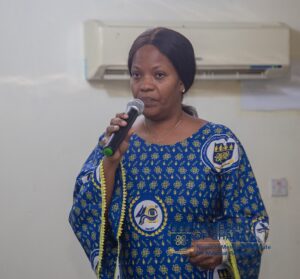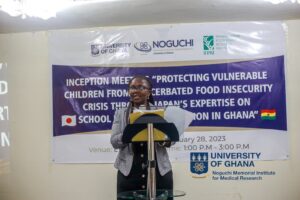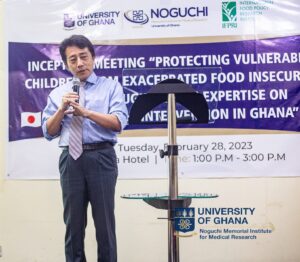A Japan funded project between the International Food Policy Research Institute (IFPRI) and the Noguchi Memorial Institute for Medical Research (NMIMR) have launched.
The project “Protecting vulnerable children from exacerbated food insecurity crisis through Japan’s expertise on school lunch: Intervention in Ghana” seeks to protect vulnerable children from situations of escalating food insecurity through Japan’s expertise.

In her remarks, Special Guest, Francisca Oteng Mensah, Deputy Minister for Gender, Children and Social Protection indicated that the homegrown Ghana School Feeding Programme like other national social protection interventions provides an opportunity to pursue the nation’s commitment to Sustainable Development Goal (SDG) with emphasis on goal one which seeks to end poverty in all of its forms. Goal two which focuses on ending hunger and achieving food security improved nutrition whilst goal four seeks to ensure inclusive and equitable quality education opportunities.
“These are important roles which will enhance access to quality basic education for boys and girls, quality early childhood development and ensure their access to safe, nutritious and sufficient food all-year round. The basic concept of the programme is to provide people in public primary schools in the poorest areas with one hot meal, nutritionally adequate meal on every school going day using locally food grown stuff. The programme is also designed to create farmers linkages through the purchase and use of local farm produce to prepare school lunch. The Government of Ghana is committed to supporting the nation’s social intervention programs which includes the Ghana School Feeding Programme,” Ms. Oteng Mensah reiterated.

Dr. Gloria Folson, project lead and a Research Fellow at the Department of Nutrition at the NMIMR explained that the inception of the project is a committed step to lessen the nutrition challenges in some parts of the country. Adding that “this inception meeting will provide a platform to engage all the appropriate stakeholders, partners and the general provide on the need for their full involvement”.

On her part, Prof. Dorothy Yeboah-Manu, Director, NMIMR stated that the School meals intervention is a multi-sectoral approach that plays an important role in long-term human capital formation by improving young children’s nutrition conditions and learning performance.
“In collaboration with Japanese experts working on school lunch from the University of Niigata Prefecture and Japan Society of Nutrition and Dietetics together with local Ghanaian expertise, the Ghana School Feeding Programme and key stakeholders, we plan to introduce a sustainable school meals intervention aiming to support and improve the Ghana School Feeding Programme by redesigning menus and strengthening linkages to local agriculture based on Japan’s experience in the school lunch programme,” Prof. Yeboah-Manu said.

Dr. Futoshi Yamauchi, project lead and a Senior Research Fellow at the Market, Trade and Institutions Division at IFPRI noted that the scope of the school food intervention is relatively minimal. Twenty schools will be selected to receive financial assistance for nutrition out of a total of forty schools initially to be utilized as an intervention.










